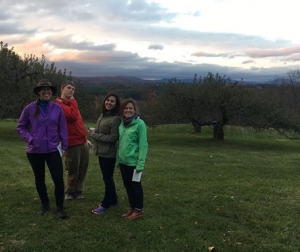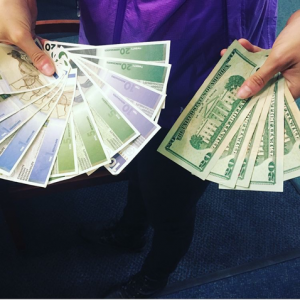
Tufts New Economy members in the apple orchard at the Schumacher Center for a New Economics in 2017
Written by Brenna Gormally, Biology Ph.D. Candidate & featuring Alice Maggio, Urban and Environmental Policy & Planning M.A. student
One of the central parts of being a graduate student at Tufts is participating in Graduate Student Organizations (GSOs). Currently, the Graduate Student Council funds twenty GSOs that cover almost every academic department. We also have GSOs that aren’t academic-related. I recently sat down with Alice Maggio, a student leader with Tufts New Economy (TNE), to chat about this active GSO.
Brenna: Could you tell me a little about TNE?
Alice: Tufts New Economy was formed in 2013 with support from the New Economy Coalition, which was funding student groups around the country that wanted to investigate, imagine, and help create a more just and sustainable economy. Often, people seem to think that one needs to be an economist to understand the economy. But all of us live in the economy every day! In that sense, we are all economists. Many of us are here at Tufts because we have recognized injustices in the world and we would like to gain further knowledge, skills, and relationships to help us contribute to a more fair, beautiful, and sustainable world. What I have found is that many of the problems we face have their roots in the current economic system, where there is an overwhelming monoculture of capitalism. Tufts New Economy is a forum where Tufts students can take time to learn together about different, emerging economic models that seek to serve people and the planet, not just profit.
Brenna: What departments are involved?
Alice: Tufts New Economy is open to everyone in the Tufts community, including graduate students, undergraduates, and professors. Right now, our membership is mostly made up of Urban and Environmental Policy and Planning (UEP) graduate students, but we also have some students from the Fletcher School and undergraduates who participate. We would be really excited to extend our welcome to more people from different departments.
Brenna: What major events do you organize?

2018 Tufts New Economy members tour Indian Line Farm, the first Community Supported Agriculture farm in the United States
Alice: Over the years, Tufts New Economy has hosted speakers at UEP’s Wednesday lunchtime Colloquia, we have regularly presented in UEP’s economics course, and we have participated in national action weeks for a more fair and sustainable economy. Last year we had a really great experience organizing a colloquium where seven Tufts New Economy members did lightning presentations on five different topics relating to the transformation of the economics around land, labor, finance, food, and clothing. For the past two years we have organized a trip to Berkshire County, Massachusetts, to learn about the new economy initiatives that are active there. We also have meetings every two weeks where we take turns facilitating and presenting on new economy topics that interest us. Anyone and everyone is welcome at our meetings at any time during the year. They are posted on our Facebook page as well as the GSC calendar.
Brenna: You just went to the Berkshires and are planning another trip to Montreal. What is the focus of these trips?
Alice: I think one of the best ways to learn about new economic models is to visit the people and places where they are happening. Because a lot of the ideas we talk about really fly in the face of what’s considered “conventional” thinking about how the economy works, it can be hard to understand and appreciate the way new economy initiatives take shape until you are there, seeing it with your own eyes and talking to people on the ground. For five years before I came to UEP I worked at the Schumacher Center for a New Economics in the Berkshires, where I ran the local currency program called BerkShares. I was also involved in the work of the Community Land Trust in the Southern Berkshires, which holds land in trust for community purposes such as housing for year-round residents and organic farming. When I came to Tufts I wanted to share what I had learned at the Schumacher Center with my classmates, so we organized a trip on the occasion of the 37th Annual E. F. Schumacher Lectures, where we got to hear legendary Native American economist and activist Winona LaDuke speak. This year we went back again for the 38th Annual Lectures, where we heard from Ed Whitfield and Leah Penniman about black economic liberation and “a new reconstruction” that involves land reclamation and community wealth building, (rather than capital accumulation).

Trading dollars for BerkShares at Lee Bank in Great Barrington, MA
Next semester we are planning a trip to Montreal to learn from the many “solidarity economy” initiatives that are intertwined there. UEP Professor Julian Agyeman spent his sabbatical there last year, and so he has a good sense of the landscape and can connect us to the most interesting groups, which include worker-owned cooperative businesses, banks that align their investments with their values, and neighborhood redevelopment projects that are financed and shaped by these solidarity economy organizations. We look forward to learning how this solidarity economy eco-system evolved and what lessons they have learned.
Brenna: What advice would you give to a prospective graduate student interested in UEP/TNE?
Alice: Come check us out! You don’t have to know anything about economics or the new economy to join us—the whole point is to learn together. We also eat well—cookies, doughnuts, and cake have been known to appear at our meetings. To join our email list and find out when our meetings are please email me at alice.maggio@tufts.edu or join the Tufts New Economy Facebook group.
